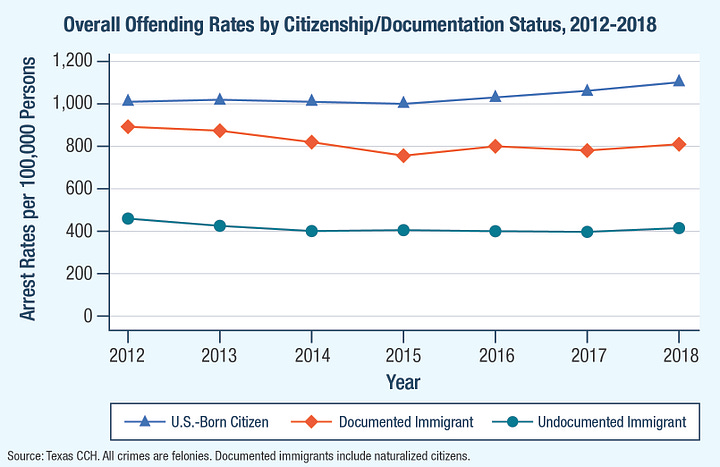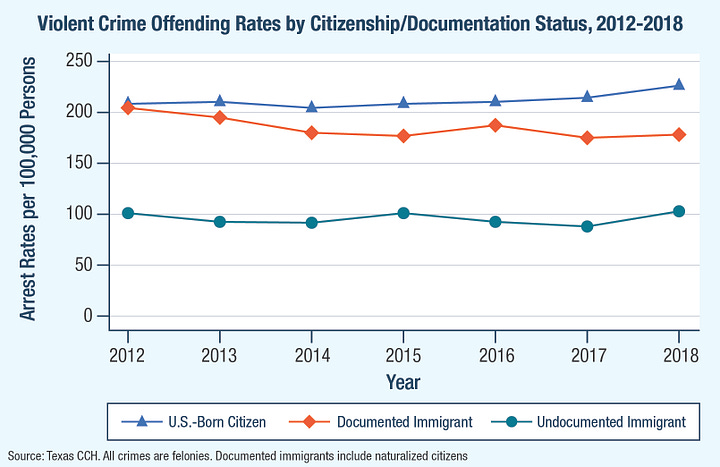Detain and Deport is not an immigration policy, it's just a campaign slogan
Can we please get serious about policy making for once?
So I’ve been having some arguments on Facebook over the last couple of days about immigration and the plans by this new administration to try to push back against what they see as the danger of “mass illegal immigration.” In the process of having these debates, I’ve been able to research and learn quite a bit about our immigration system, and about the policy options out there to address our broken immigration system. I want to share some of the things I’ve learned here for anyone interested, left, right or center.
First, let me state up front, I do recognize that immigration is a serious question facing our country right now, and I also agree with the assessment that a large message sent by both Trump elections was a growing anger over illegal immigration. I’m not denying that reality. I’m also not denying the fact that, as a country, we must do something about it. I recognize that our policy makers have failed to do anything of real substance about it for about 30 years, an extreme dereliction of duty. I’m not really interested in defending one side or the other, or litigating who is at fault in the various bills or legislative pushes that have come up over the last several decades. Both sides can share the blame, at the very least for their collective shrug over it, and their willingness to accept the continuing crisis as a political tool to bludgeon one another with. It’s politics at it worst, and it’s infuriating. Take just the most recent failure: last year, when Donald Trump and his allies killed Sen. Lankford’s immigration bill that had majority support in both houses, because Trump saw its passage as a danger to his re-election chances because he would no longer be able to scapegoat immigrants and Democrats. Shame on him, and his cronies in Congress, for putting politics before solutions. Shame on Biden and the Democrats for failing for four years to do anything legislatively as well.
Overall, I’m really interested in the question of, what policy response is appropriate and realistic? What could our policy makers do, if they chose to get serious about addressing immigration reform? And, in contrast, what policy responses are our current leaders in government actually proposing to do?
Let’s start here: who are these undocumented immigrants? Most recent estimates1 say there are about 11 million undocumented people here in America, which is actually down from the high of about 13 million recorded a little over a decade ago. These 11 million mostly come from Latin America, with a good chunk of them also here from southeast Asia. They are broadly spread out across the United States, with the largest numbers residing in Texas, California, and Florida. Of those 11 million, about 8 million of them work, making up a full 5% of the American workforce.
Here’s a really, really important statistic to keep in mind, as we discuss the humanness of immigration policy: about 4.4 million U.S. citizen children have at least one parent who is here illegally. These 4.4 million kids are part of the collateral damage of whatever immigration policy we enact. One more time: 4.4 million kids, who are citizens, here completely legally.
One of the first things I think we need to do is break down one key myth I keep seeing: that undocumented immigrants are uniquely dangerous individuals, more so than naturalized or American-born people. This is a myth. These two charts show that.


Put together by the Texas Department of Public Safety, they show that undocumented immigrants actually commit all crimes at a lower rate that US citizens and legal immigrants, and they commit car fewer violent crimes as well. The idea that they are somehow uniquely dangerous is just not true, a lie thrown around to scare voters. While every crime committed is terrible, especially violent crime, the idea that our country is more unsafe because of undocumented immigrants is simply not true.
So, 11 million undocumented people are in America. They either overstayed a legal visa, or they circumvented legal immigration channels and crossed a border unlawfully. Either way, they are breaking American law by residing in our country without permission. And they present a problem of unfairness, to those who have waited in our long immigration lines to get in legally. What incentive is there to follow the laws and come to our country legally, when so many have flaunted those laws and very little it being done about it? This is the root of the problem. There is no denying that this is happening.
But, what do we do about it? Well, the refrain I hear from conservatives and the Trump movement is “round them up and deport them all,” which is not really a policy as much as a social media slogan. Rounding up every one of the 11 million undocumented immigrants in America is so unserious a solution as to be laughable and nonsensical. The American Immigration Council has a really well-done and eye-opening study on what it would take to round up and deport every undocumented person in America. Here are some of their findings:
$89.3 billion to conduct arrests
$167.8 billion to detain arrestees for while waiting for processing
$34.1 billion for the legal process
$24.1 billion for the actual removals
Total costs for a one-time deportation event of $315 billion. Not budgetary costs, mind you; these are one time costs that would be incurred on top of the regular federal budget.
Hiring somewhere between 220,000 and 409,000 new government employees, including over 30,000 new ICE agents, making it the largest law enforcement agency in the United States.
A total of $967.9 billion in annual spending to maintain deportation rates year over year.
Those are eye popping numbers. And they don’t even take into account the efficacy of such a program, or the downstream consequences. These would include:
A massive labor shock, as 5% of the American workforce would disappear almost overnight.
Devastating blows to key US industries, including construction and agriculture, where close to 20% of the workforce is undocumented. This would have real life pocketbook effects on American citizens, via higher prices on food items and skyrocketing costs in the housing market as demand quickly outpaces supply.
$22.6 billion lost annually for Social Security, and $5.7 million lost for Medicare.
A reduction in the neighborhood of $250 billion in consumer spending power, dealing a crippling blow to business bottom lines.
A GDP contraction of 4.2 to 6.8%, accounting for a loss of about $1.1 trillion to $1.7 trillion. For comparison, the economy contracted 4.6% between 2007 and 2009, during the Great Recession.
A massive reduction in tax receipts that would cripple every facet of our federal government.
Oh yeah, and remember those 4.4 million children, American citizens all of them? It’s hard to say what would happen to them; some would also be deported, despite their legal status. Hopefully, families here legally could take some. A lot would probably get shunted into our largely broken adoption systems. Whatever happened to them, there is no way to quantify the massive psychological harm done to children who have done nothing wrong, and the moral stain that would leave on the soul of our nation.
This is, I think, the most underappreciated aspect of this debate for conservatives: the real-world human cost. I think too often, conservatives want to strip out the human element from these policies, making wholly utilitarian arguments. But we simply cannot do that. Policy making exists for people, for the betterment of their lives, not the other way around. The moral impact on us, as a people, would be immense. We would have to reckon not just with the anguish and suffering caused to immigrants through this process. We also must grapple with the effects it would have on our human and civil rights, even those of us who are legal citizens. This would require mass police movements, breaking down doors of businesses and homes and places of worship and schools. It would involve scenes on the news every day of crying, anguished families being torn apart, of violence against those who resist, of American citizens who attempt to shield immigrants being abused. This would not be some small, benign, easy process, done mostly in the background of our lives like a lot of government action. This would be in our face, and a very clear and obvious moral stain that would be hard for our social contract to ever recover from. I don’t mean that as a threat; it’s simply my safe bet of the real human cost, based on my understanding of history and human nature.
Is such a massive, one-time police action even possible? I don’t see how. Maybe we could round up half, or two thirds of undocumented people. But I just don’t think the American people have the stomach for a sustained campaign, and I don’t think we could logistically pull it off. It would be an action on the scope of few ever seen in world history. It's definitely not a desirable outcome, if you are concerned with human rights and our constitutional democracy.
Here is the crux of this debate, to me: our immigration system is broken because of us. We did this. Our leaders did this. Through their inability to legislate, through American foreign policy towards Latin America: we are responsible for this. The people who came here illegally? They are rational actors, doing that which most of us would likely do were we in their shoes. Just because it was illegal does not make it incomprehensible. But, what the Trump administration proposes to do, the rounding of by force of these undocumented people, is to foist our failing onto the shoulders of those who did not cause the problem. It’s passing the buck. We caused this problem. We must suck it up and realize we get to bear the cost, which is this: we must reform the immigration process, wholesale, to be more responsive and comprehensible and rational. We must adjust our foreign policy, to address the very real reasons people are fleeing Latin America in such large numbers – namely, a wildly out of control drug trade, gang warfare, endemic poverty, and authoritarian, undemocratic governments. And finally, we must bite the bullet and extend amnesty to those already here illegally. There is no other option. Rounding them all up is morally bankrupt and logistically impossible. This is the price we pay for our polarization and our democratic breakdown.
This is a hard debate. I get that. There are no good or easy answers. But, we cannot allow that reality to push us into language and actions that are dehumanizing and reminiscent of the worst moments in human history. We must be better as a people. We must remain true to our democratic heritage, to our regard for human rights, and to the better vision of what America can be. And, most of all, we must cling tightly to our empathy for other human beings, regardless of their immigration status. We must hold empathy for one another, and for those who want to see this fixed. Otherwise, this is never getting fixed, and will more likely just tear us apart.
Statistics in these next two paragraphs are from Pew Research.



